Qualified web developers are most wanted these days. However, one can’t become a skilled specialist from day one. Learning is key. That’s what we’ve prepared a best website development course list full of classes that suit your objectives and timetable regardless of the goal. For this purpose, we’ve examined, evaluated, and contrasted dozens of internet platforms to assist you in locating the best fit.
Here’s our choice for the top 15 web development courses for 2025. and we welcome you to learn.
Web Development: What Is It Really?
The process of building and managing websites and web applications is known as web development. For instance, web developers forge a static landing page or intricate, data-driven web applications. The important areas of web development include:
- Front-end development: HTML, CSS, and JavaScript user interfaces,
- Back-end development: Databases, server-side logic, and infrastructure,
- Content Management Systems (CMS): Content creation and management platforms such as WordPress.
However, before delving into how we choose the best best course for website development, let’s first clarify the criteria to choose a course in 2025.
15 Beginner-Friendly Web Development Courses for 2025
We made our choices based on a number of significant considerations. This covered the structure and content of the courses, the user interface and experience, the degree of engagement and interaction, the worth of the certificates provided, and the degree of community support on each platform.
Together, these standards enabled us to find classes that are in line with practical job requirements while still being efficient and pleasurable to take. Each best website development course online or not includes a quick overview, price, certification status, and pros/cons to help you choose.
1. Mimo
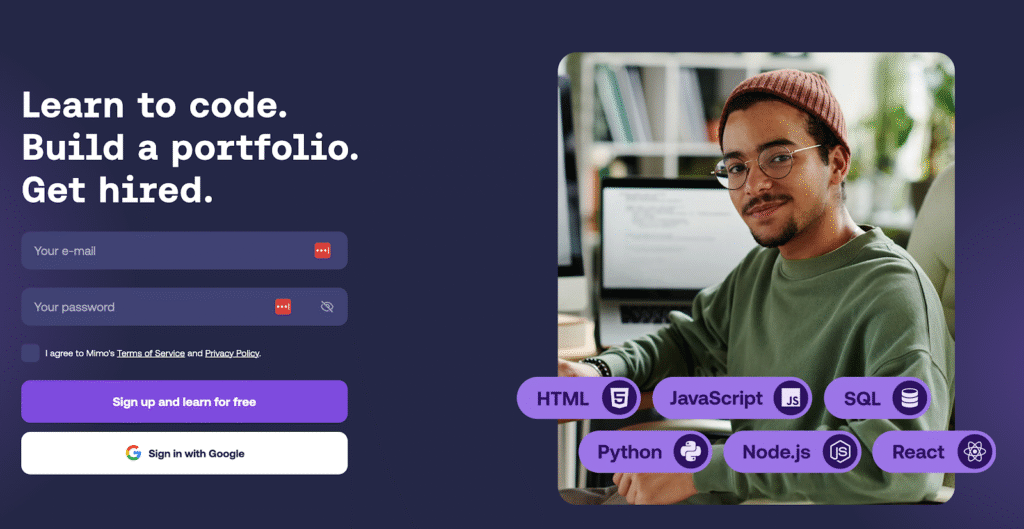
Mimo is a best course for website development for novice programmers. By breaking down difficult coding ideas into manageable, interactive chunks, it provides a gamified method to learning.
The platform’s easy-to-use UI, brief lessons, and immediate feedback inspire you to keep learning and give you a sense of accomplishment. Three primary learning pathways are available on Mimo:
- Front-end development is the process of using HTML, CSS, and JavaScript to create user interfaces that are both interactive and aesthetically pleasing.
- You can design whole web apps using full-stack development, which includes front-end and back-end development using Node.js, Express, and SQL.
- Python development: This course focuses on Python programming and teaches you how to create and implement a variety of applications using this flexible language.
Aside from career routes, Mimo continuously adds new courses in website building to assist students stay up to date with emerging trends.
2. Codeacademy
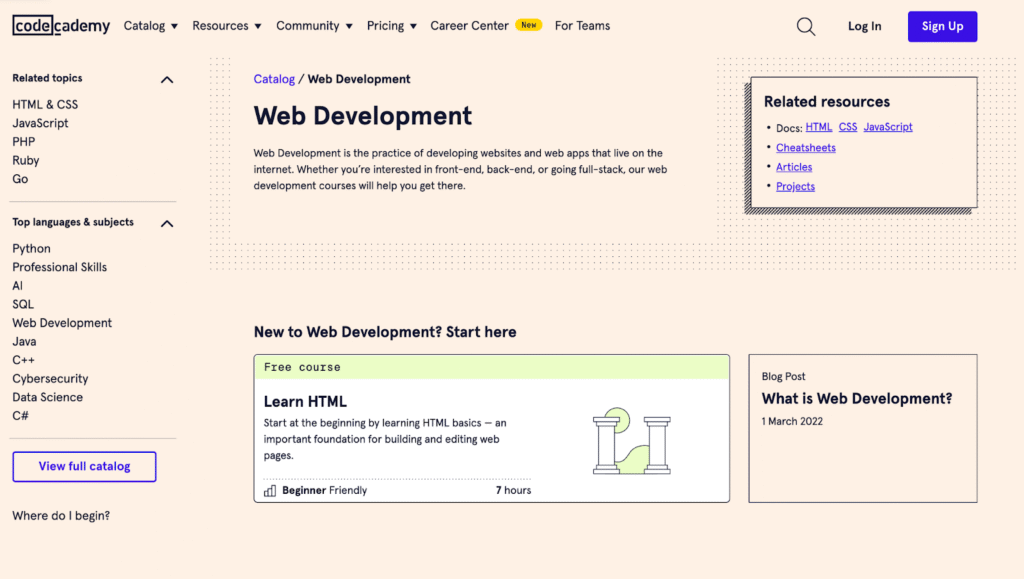
A best website development course online, Codecademy provides interactive courses in a variety of web development skills and coding languages. It is a great option for novices and people who wish to learn different coding concepts because of its intuitive design and practical approach.
With a variety of premium and free content available, students can select the course that best fits their objectives and financial constraints. What you will discover:
- Codecademy provides extensive learning pathways, such as:
- Front-end development using React, HTML, CSS, and JavaScript.
- Full-stack development: proficiency with both front-end and back-end technologies, such as SQL, Node.js, and Express.
- Python development: the basics and more complex ideas of Python that are useful for data research, web development, and other fields.
3. Programiz
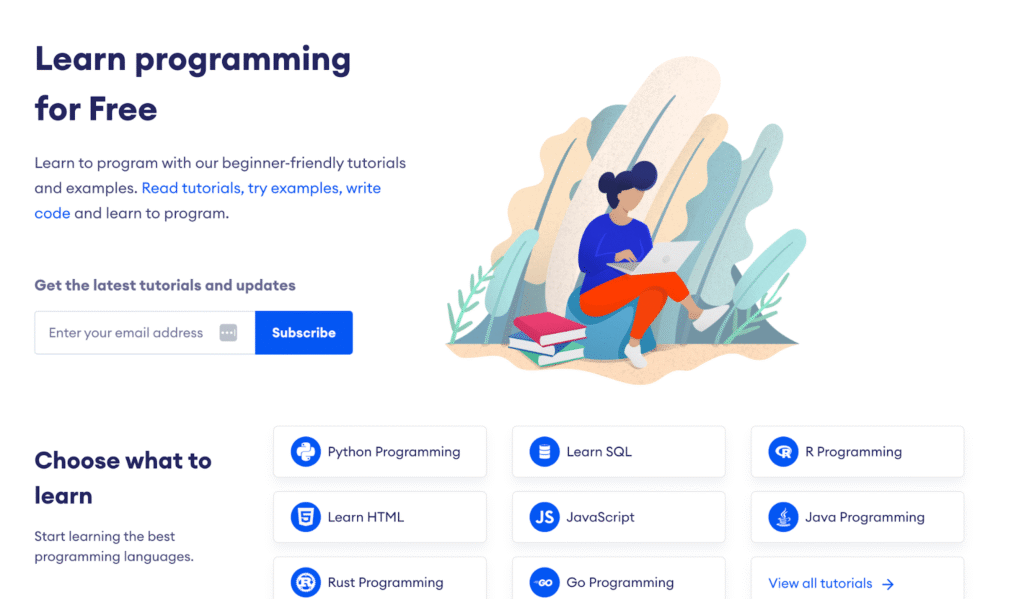
Programiz is a best website development course that offer easy-to-use online learning environment. For a number of programming languages, including Python, JavaScript, and C++, it provides interactive tutorials.
Through coding challenges and projects that assist users in developing practical skills, the site places a strong emphasis on experiential learning. Users are guided step-by-step through the structured, modular courses, which simplify difficult concepts.
Programiz covers fundamental programming ideas in a variety of languages. Users will discover:
- Python: From the fundamentals to more complex subjects, ideal for web development and data science.
- JavaScript: Fundamental ideas in web development.
- Web page design and development using HTML and CSS.
- C++: Foundations of system programming and software development.
4. Sololearn
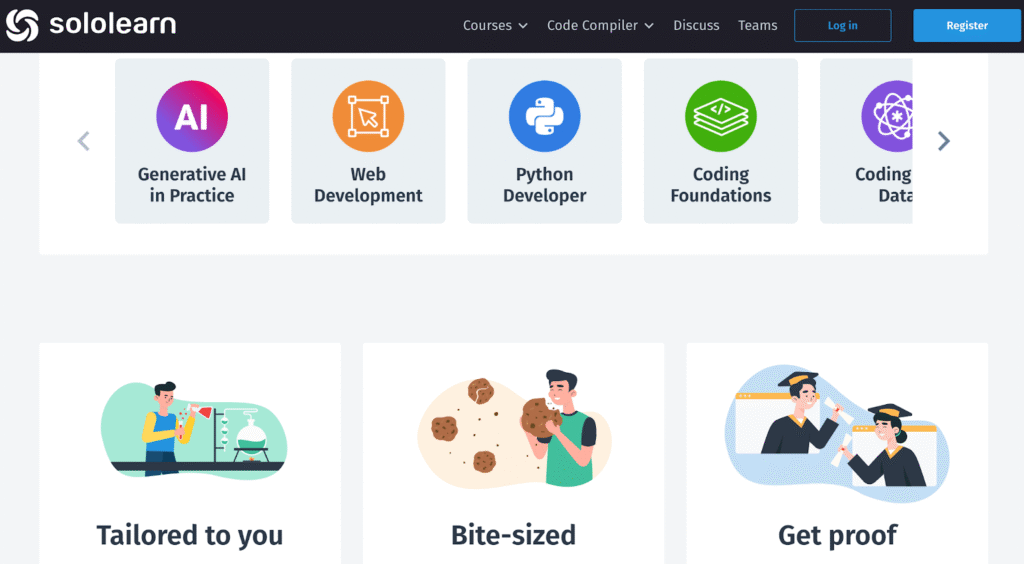
Bite-sized courses, tests, and challenges for a variety of programming languages are available on Sololearn, a mobile-first learning platform. Users are encouraged to advance through stages and receive rewards thanks to its gamified approach. Sololearn is mostly mobile-based, although it also has a desktop browser interface.
Comprehensive courses offered by Sololearn cover:
- Web development: JavaScript, HTML, and CSS.
- Python, Java, C++, C#, PHP, Ruby, and other programming languages are available.
- Fundamental ideas and real-world applications of data science and algorithms.
- App development: online and mobile applications.
The learning procedure at Sololearn consists of brief, interactive lessons that are supplemented with quizzes. Additionally, users can interact with a community forum for assistance and cooperation, as well as take part in coding competitions.
Additional services like code coaching and tailored practice advice are available to Pro subscribers.
5. freeCodeCamp
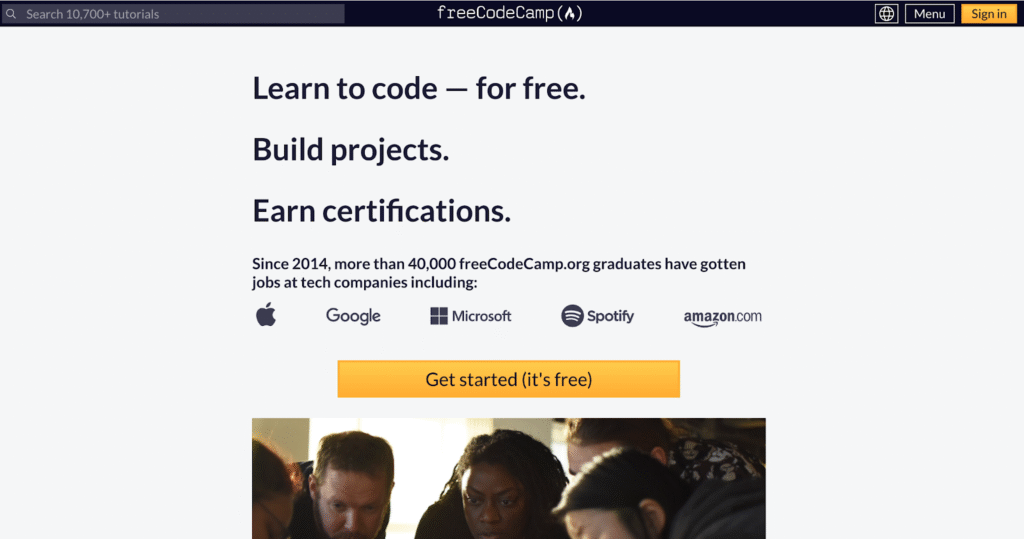
A non-profit group called freeCodeCamp provides a thorough, website development free course. Through their project-based learning methodology, students can develop real-world projects and acquire useful skills. FreeCodeCamp is a great choice for anyone looking to improve their web programming abilities because it offers a helpful community and a variety of tools.
Moreover, FreeCodeCamp provides a variety of courses, such as:
- HTML, CSS, Flexbox, and Grid are the components of responsive web design.
- JavaScript data structures and algorithms: functional programming, ES6, OOP, and JavaScript fundamentals.
- Libraries for front-end development: jQuery, SASS, Redux, Bootstrap, and React.
- Microservices and APIs: MongoDB, Express, and Node.js.
- Python fundamentals, NumPy, and data analysis for scientific computing.
The course material is organized into certifications, each of which requires students to complete a number of tasks in order to prove their comprehension.
Along the way, students watch video lectures, read educational articles, and finish interactive coding tasks.
6. W3Schools
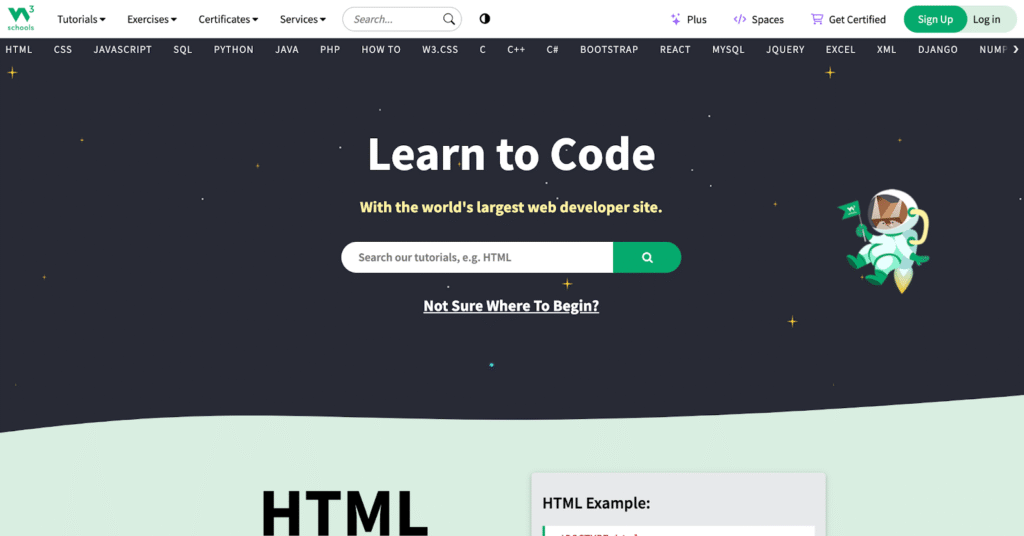
A best website development course online,beyond doubt, is W3Schools. It provides an extensive library of examples, references, and tutorials on HTML, CSS, JavaScript, and other subjects related to web development.
The site is renowned for its “Try it Yourself” editor, which lets users play with code right in the browser, and its straightforward, understandable explanations.
W3Schools may not be the greatest choice for students looking for a more supervised approach because it is essentially a reference tool rather than an organized web development school.
W3Schools provides training courses and certification courses in:
- HTML and CSS: From the fundamentals to more complex methods, such as HTML5 and CSS3.
- JavaScript: Basics and more complex subjects, such as React, jQuery, and ES6.
- Python, Node.js, PHP, SQL, and other server-side languages.
- Web frameworks and libraries: Angular, React, Vue.js, and Bootstrap.
- Data analytics: NumPy, Pandas, Data Science, and more.
Users can navigate tutorials and references at their own leisure with W3Schools’ self-directed learning methodology. In addition to exercises and quizzes to assess your comprehension, the “Try it Yourself” editor facilitates practical practice.
7. Introduction to Web Development (Coursera)
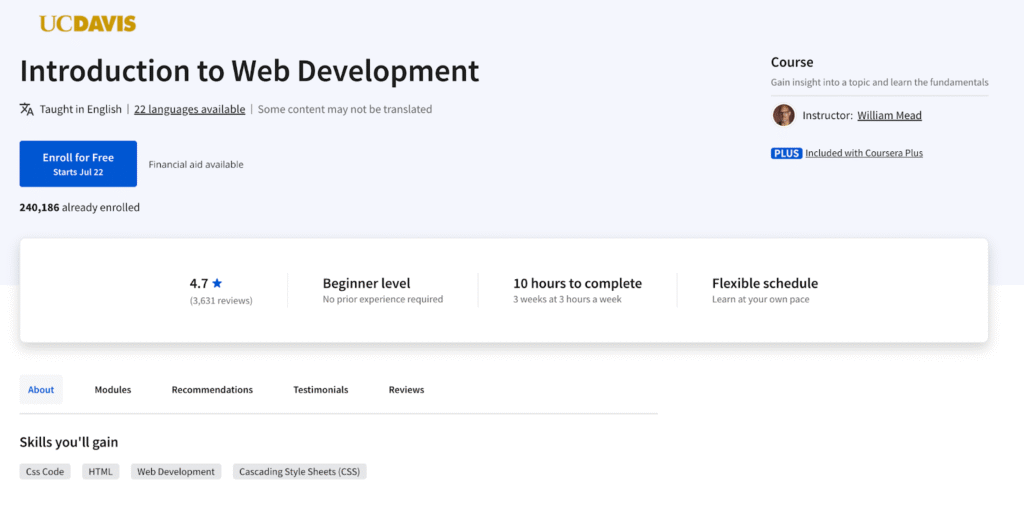
The fundamental technologies of web development are thoroughly introduced in this Coursera course.
The course gives students the fundamental knowledge and abilities to create and style simple web pages and incorporate interactive components by covering HTML, CSS, and JavaScript. In order to give students a comprehensive understanding of how websites are made and maintained, the course also discusses web hosting and domain names.
You will gain knowledge of the intent technologies’ architecture and operation:
- How to use HTML and CSS to create static web pages.
- Selecting and utilizing web hosting.
- Creating webpages on the internet.
- Essential tools and concepts for web development.
Readings, quizzes, practical tasks, and video lectures are all used to provide the course. Because it is self-paced, students can finish it whenever it is most convenient for them.
8. Introduction to Web Development by IBM
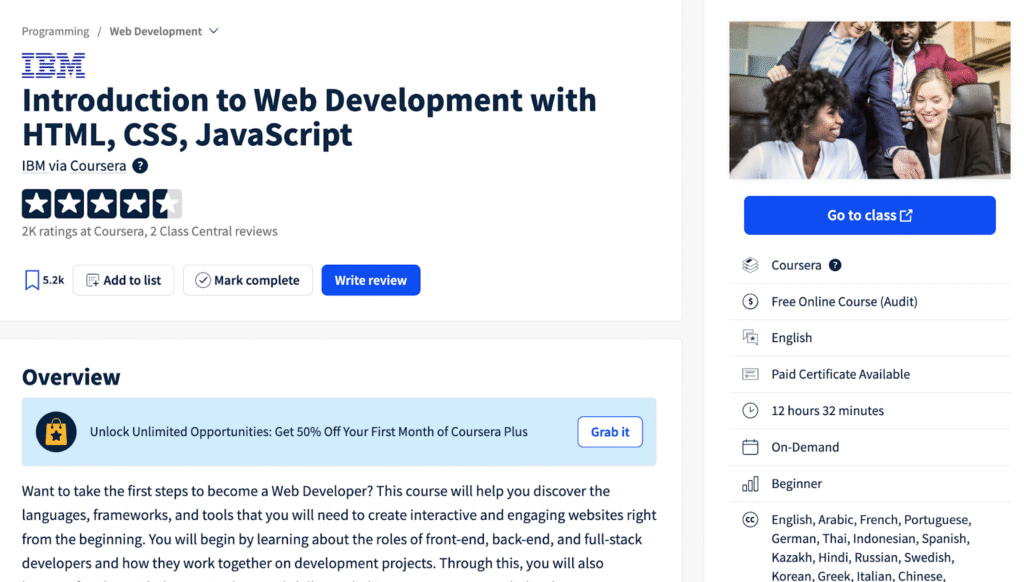
This IBM course on web development offers a comprehensive introduction to programming. It goes over the basic ideas, resources, and technologies needed to create the user interface of websites and online apps.
Beginning with the fundamentals of HTML, CSS, and JavaScript, the course progresses to more complex subjects including web accessibility, responsive web design, and Git version control. You will study the fundamentals of JavaScript, HTML, and CSS:
- Concepts of responsive web design.
- Web accessibility standards.
- Git version control.
- Fundamental server-side ideas.
- Overview of cloud computing.
Video lectures, texts, tests, and practical exercises are used to teach the course. Using the ideas they acquire throughout the course, students will create their own websites and other projects.
9. The Complete 2024 Web Development Bootcamp (Udemy)
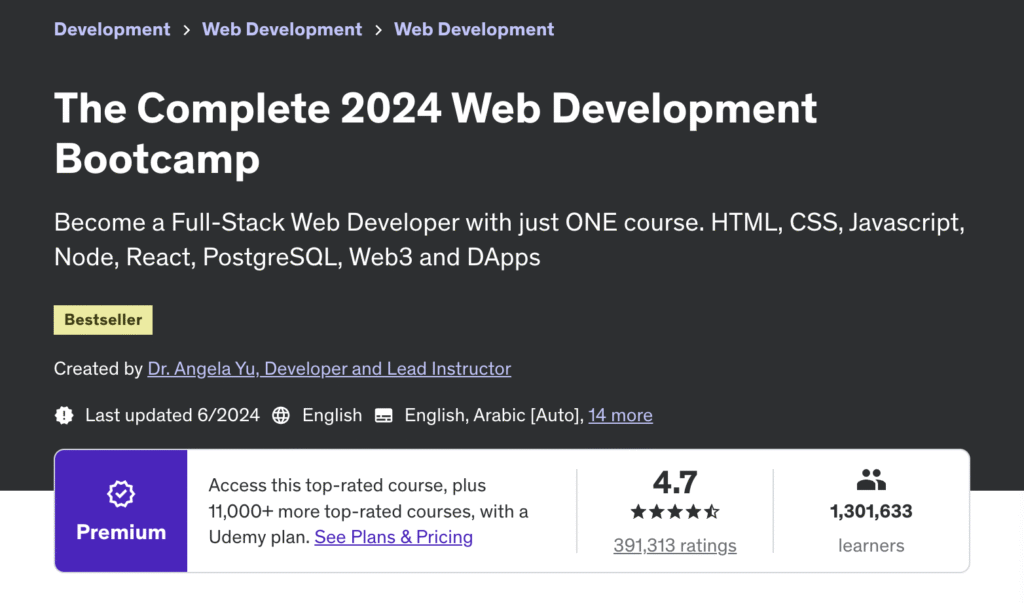
Aspiring web developers frequently choose Dr. Angela Yu’s extensive Udemy course. From front-end technologies like HTML, CSS, and JavaScript to back-end programming using Node.js and databases like MongoDB, it covers a lot of ground.
Complex ideas are made easier to understand by the instructor’s captivating teaching style and concise explanations.
- You will study the basics of HTML, CSS, and JavaScript.
- For responsive design, use the Bootstrap framework.
- Dynamic web pages with DOM manipulation.
- For server-side programming, use Express.js and Node.js.
- MongoDB is used for database administration.
- RESTful web services and integration with APIs.
- Web application deployment.
The course is divided into lectures and sections, each of which focuses on a different subject. You will have access to a Q&A forum for assistance, and the instructor will provide you detailed explanations and examples.
10. Node.js, Express, MongoDB & More: The Complete Bootcamp (Udemy)
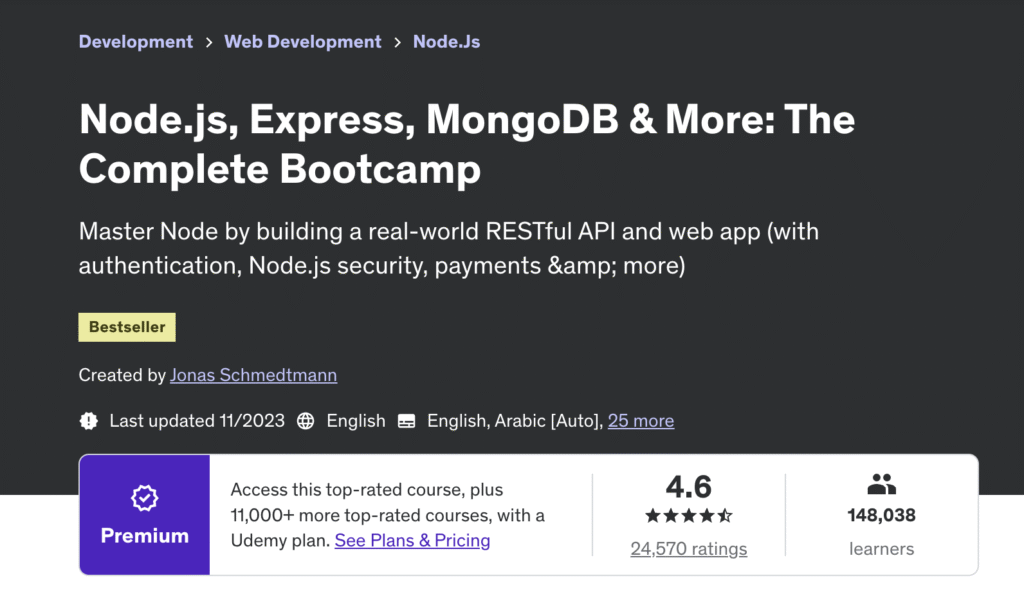
Jonas Schmedtmann’s Udemy course will show you how to use Node.js, Express, MongoDB, and other related technologies to create back-end web applications that are quick, scalable, and strong.
Because the course is project-based, you will gain knowledge by creating a fully functional application with a server-side and RESTful API.
- Learn the basics of Node.js, including modules, asynchronous JavaScript, event loops, etc.
- Express.js is a framework for creating APIs and web apps.
- MongoDB for storing and modeling data.
- To work with MongoDB in Node.js, use Mongoose.
- Best practices and guidelines for designing RESTful APIs.
- Authorization and authentication to protect web apps.
The course is organized around practical projects, which include a thorough final project that incorporates all of the knowledge gained. It includes interactive coding assignments, quizzes, real-world projects, and video lectures.
11. Meta Front-End Developer Professional Certificate
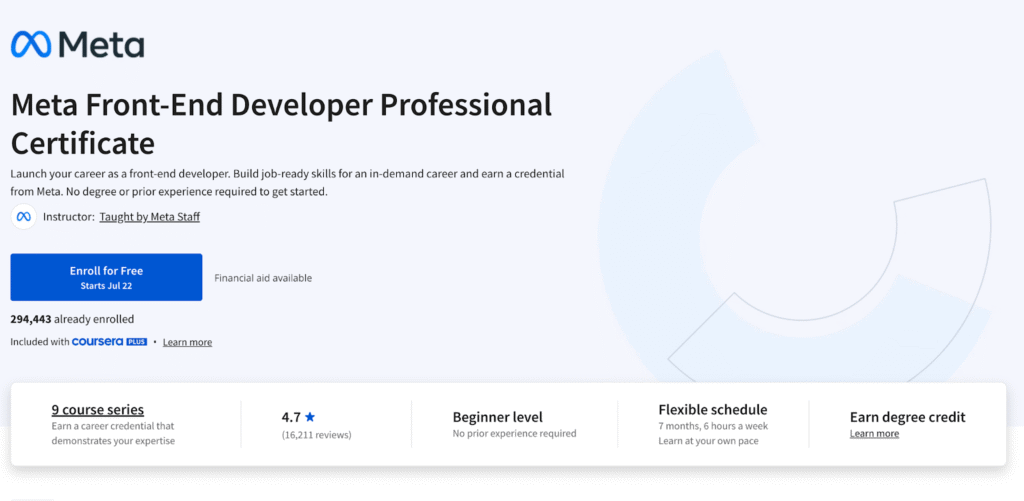
Experts in Meta have selected the course curriculum, which emphasizes practical skills necessary for the field. It emphasizes practical knowledge and hands-on experience while offering a solid foundation in front-end development.
You will study the basics of HTML5, CSS, and JavaScript:
- Responsive web design using Grid and CSS Flexbox.
- Use JavaScript to create dynamic web pages.
- Utilizing Bootstrap and React to create expert page layouts.
- Using Figma to design user interfaces.
- Git and GitHub version control.
- Systems for managing content (CMS).
- Methods for image editing.
The curriculum is divided into several courses, each of which focuses on a distinct facet of front-end development. Video lectures, self-assessment tasks, tests, practical laboratories, and graded evaluations are all included.
12. Full Stack Web Developer (Udacity)
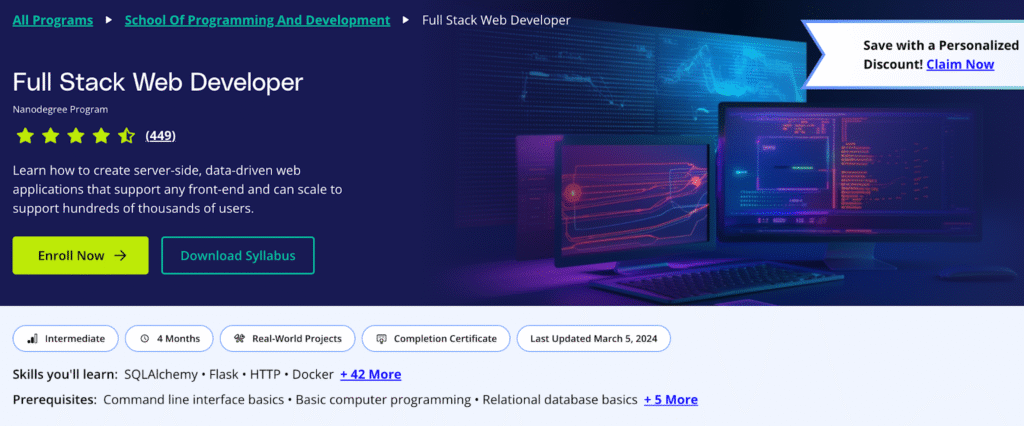
This thorough, project-based Full Stack Web Developer Nanodegree program gives students the tools they need to become full-stack developers who are prepared for the workforce. Students will construct a number of real-world projects during the course, which will culminate in a capstone project that showcases their full-stack capabilities.
You will learn front-end development using JavaScript, HTML, and CSS:
- Bootstrap is used in responsive design.
- server-side Python and Flask programming.
- SQL-based database administration and design.
- creation and integration of APIs.
- Web application deployment and hosting.
Under the Nanodegree program’s project-based learning methodology, students construct progressively intricate projects. Exercises, tests, and video lectures are included with every project.
13. Google for Developers
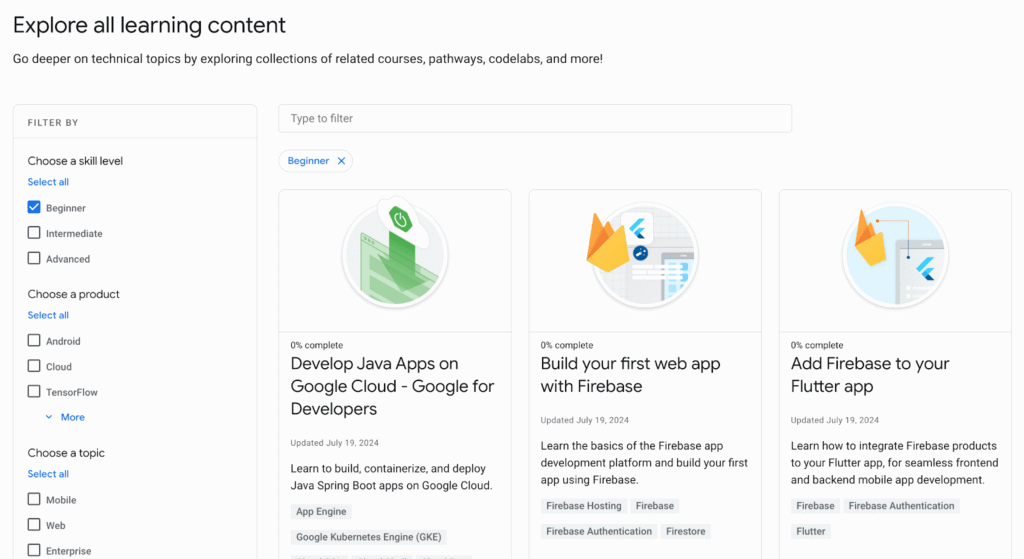
Google developed Google for Developers, a comprehensive resource center, to empower developers of all skill levels. It provides a plethora of knowledge, resources, and tools for creating Google technology-based apps, websites, and experiences. Among the many subjects covered by Google for Developers are:
- Development of Android apps.
- Angular, Flutter, and more frameworks for web development.
- Google Cloud Platform for cloud computing.
- TensorFlow in machine learning.
- For creating real-time applications, use Firebase.
- Creation of Chrome add-ons.
- Best practices for design and user experience.
Readings, quizzes, practical projects, and video lectures are all used to teach Google for Developers courses. With flexible timetables, students can learn at their own speed. Additionally, some programs have capstone projects that mimic real-world responsibilities and graded exams.
14. Learn HTML and CSS by Scrimba
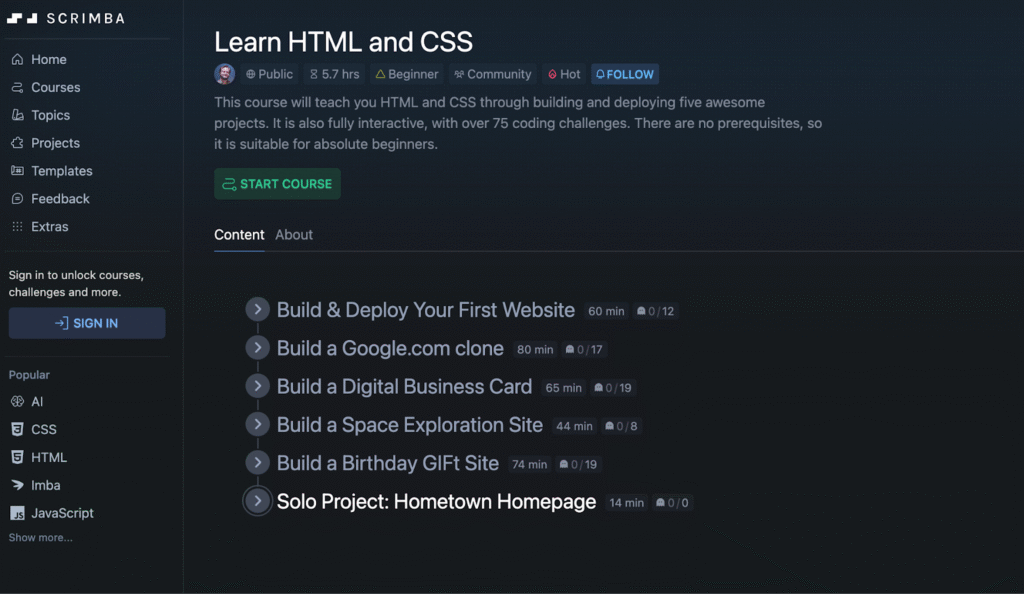
The “Learn HTML and CSS” course on Scrimba offers an engaging and approachable introduction to the foundations of web development. The course emphasizes instruction by creating real-world projects, which enables students to immediately see how their knowledge is applied in the actual world.
You will study the basics of HTML, including tags, elements, attributes, and structure:
- CSS basics: layouts, values, properties, and selectors.
- Using programs like Netlify to create and launch websites.
- Concepts of responsive web design.
- Best practices for creating code that is clear and easy to maintain.
The instructor walks you through creating projects step-by-step in Scrimba’s screencast-based course. As you study, you can experiment and practice by pausing the video whenever you want to code in the integrated editor.
15. Traversy Media: YouTube Tutorials
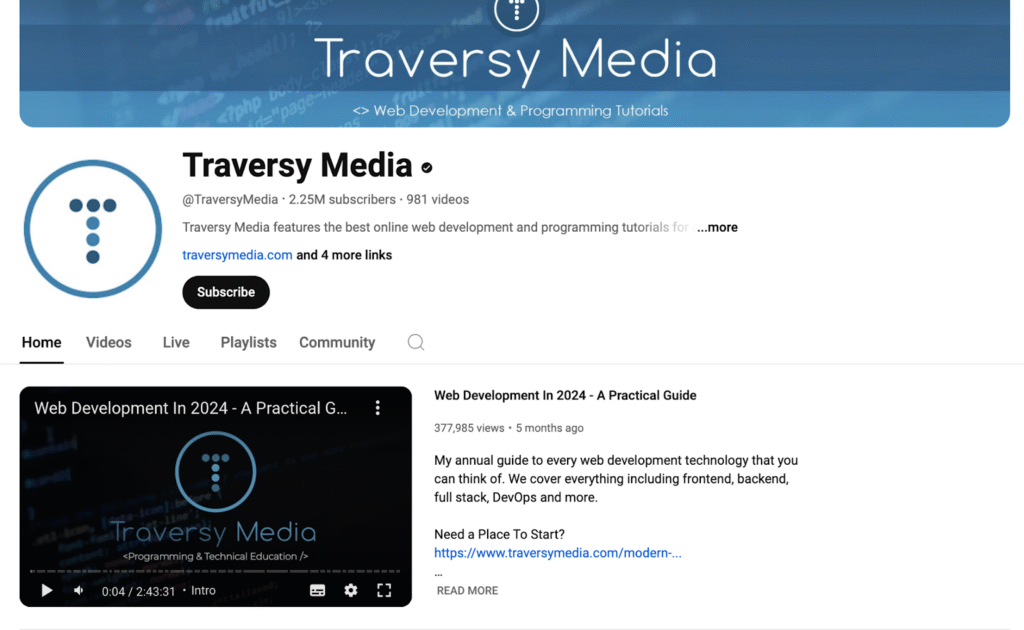
Brad Traversy is the owner of the well-known YouTube channel Traversy Media, which provides a variety of web development training. HTML, CSS, JavaScript, React, Node.js, and many other web development subjects are covered by the channel. Brad is known for his straightforward and practical teaching methods, which make difficult subjects understandable to novices while providing depth for more experienced students.
You will study everything from the basics of HTML and CSS to more complex ideas like responsive design:
- JavaScript frameworks and concepts.
- Frameworks and concepts for back-end development.
- Additional technologies include CSS Grid, Bootstrap, Svelte, and others.
The majority of the tutorials are video-based and include Brad’s detailed instructions. Learners can follow along and practice using the coding activities and project walkthroughs included in each session. To build a portfolio and learn from scratch, these tutorials are insufficient. However, when combined with a supervised development course, they can be a fantastic supplement.
The Comparison
Below is a comparison table to help you quickly evaluate key aspects of each course:
| Course | Rating | Best For | Price | Certification | Pros | Cons |
| Mimo | 4.4/5 | Beginners, career changers | Free / $24.99 Pro | Yes | Gamified, mobile app, real projects | Limited advanced content |
| Codecademy | 3.7/5 | Interactive learners | Free / $14.99 Pro | Pro only | Variety, hands-on learning | No mobile app, shallow depth |
| Programiz | 4.3/5 | Intro to code | Free / $10 Pro | Yes | Clean UI, interactive | Text-heavy, basic coverage |
| Sololearn | 4.3/5 | Learning on the go | Free / $5.83 Pro | Pro only | Gamified, bite-sized | Limited project work |
| freeCodeCamp | 7.3/10 | Project-based learning | Free | Yes | Real projects, in-depth | Less structured, self-paced |
| W3Schools | 3.6/5 | Reference-style learners | Free / Paid certs | Yes | Interactive editor, wide topics | Outdated content, no structure |
| Coursera – Web Dev Intro | 4.7/5 | Total beginners | Free / Paid cert | Yes | Broad, hands-on | Limited scope |
| IBM – Web Dev Intro | 4.4/5 | Front-end fundamentals | Free / Paid cert | Yes | Git, accessibility, modern tools | Minimal back-end |
| Udemy Web Dev Bootcamp | 4.7/5 | Full-stack learners | ~$20 | Yes | Engaging, full coverage | Long, info-heavy for beginners |
| Udemy Node.js Bootcamp | 4.6/5 | Back-end learners | ~$20 | Yes | Real-world backend skills | Requires prior JS knowledge |
| Meta Front-End Cert | 4.7/5 | Front-end developers | Free / Paid cert | Yes | Meta-backed, career focus | Only front-end skills |
| Udacity Full Stack | 4.6/5 | Career-ready developers | $846 | Yes | Mentorship, deep content | Costly, needs prior experience |
| Google for Developers | 4.6/5 | Google tech stack users | Free | Varies | Extensive tools | Unstructured, not beginner-first |
| Scrimba – HTML & CSS | 4.5/5 | Interactive front-end learners | Free | No | Screencast, real projects | Only front-end, no cert |
| Traversy Media (YouTube) | 4.5/5 | Free tutorial seekers | Free | No | Great clarity, wide topics | No structure, no projects |
Concluding Remarks: Locating the Top Web Development Course
There is a web development course for everyone, regardless of background. The resources are available whether you want project-based independence (freeCodeCamp, Scrimba) or structured learning (Mimo, Meta, Udemy), there are also website development free courses. Start with what makes you happy and keep improving.
FAQ
Is it worthwhile to obtain a web developer certificate?
Yes, particularly when combined with actual initiatives. Credibility is increased and your abilities are validated by certificates from sites like Mimo, Meta, or Udacity.
Who makes the greatest money as a web developer?
Back-end and React-focused front-end developers are paid lower than full-stack developers.
Does learning web programming take a year?
Yes, with regular practice and study. Many students become employable in six to twelve months.
Is thirty years old too old to work as a web developer?
Absolutely not. A lot of coders begin in their 30s and later. One of your strengths is your life experience.